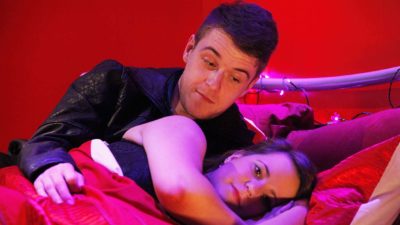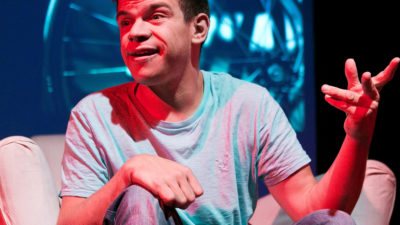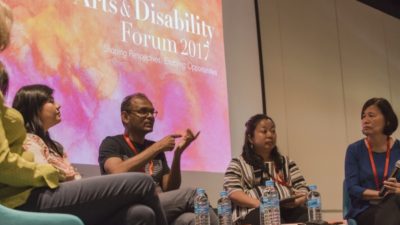Disability Arts International talks to Robert Softley Gale, Artistic Director of Birds of Paradise Theatre Company, to find out about the company’s work in Hong Kong to create a thrilling courtroom drama, due to take place with live, linked simultaneous performances in Hong Kong and Glasgow.
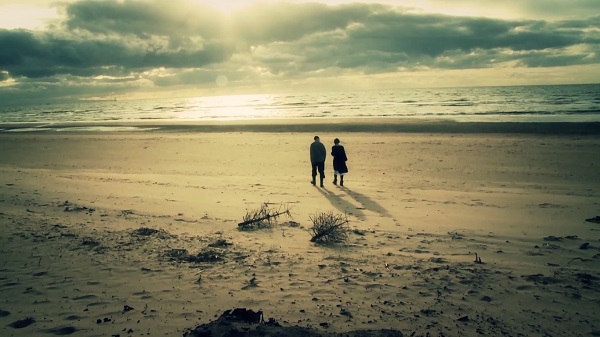
The project began back in 2014 when the British Council was asking for submissions for research around projects connected to Shakespeare. My fellow co-Artistic Director Garry Robson has been involved in many Shakespeare productions including creating a dance piece with Common Ground based around the characters of Caliban, Miranda, Prospero and Sycorax and working with Jenny Sealey on Interplay’s version, Sea Changes.
When we discussed what we were interested in pitching for, we both got excited about the crip narrative that exists around the character Caliban. Historically, Caliban is seen as this ugly monster, with more than a touch of otherness about him, and we were both compelled by the idea of investigating that in terms of disability. Is Caliban disabled or not? The strength of the character and of his relationships within the Tempest presented us with a number of existential dilemmas we could weave into an interpretation.
Is the relationship between Caliban and Prospero’s daughter Miranda a romantic relationship? Was Caliban misinterpreted by Prospero? Are we somehow misinterpreting the character because of our understanding of Caliban as a monster? We didn’t want to retell the story, but to explore what the character represents for a contemporary audience.
Our research took us to Hong Kong because we were looking for an island context and knew that there were a number of disabled artists already working at an established level there. So in November 2015 myself, Garry and Jude Mahon, a performer/BSL interpreter, spent a week with two disabled artists – a movement specialist Jason Wong and a photographer Kevin Cheng.
In that time, we looked at how we could bring the characters from The Tempest to life, analyzing what they tell us about how we view our current situation in terms of disability and otherness.
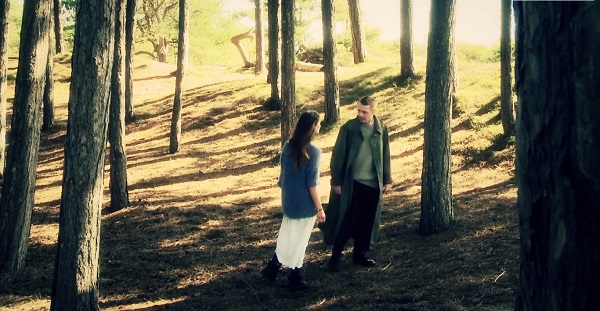
Another reason for looking at the Tempest as a starting point rather than as an end performance, is that Kevin and Jason’s first language isn’t English. Not being burdened by a script or a text freed us to explore our themes in a way that worked for them, as artists.
The concept of ‘home’ is also integral to the piece. The island in The Tempest is home for Caliban long before other people come to claim it as their own. There is a clear resonance there with the history of Hong Kong and the claim made on the island as a colony of the British Empire. But, also as disabled artists what does home mean to us? Given that our community, our culture might not be at home within society, it might be somewhere else entirely.
What Garry and I bring to the table with Birds of Paradise is very much about disability and identity. Within the context of Hong Kong, the cultural imperatives around disability are very different, so our intention was also to look at what those cultural differences are and how we can begin to unpick them. Both the dancer Jason Wong and performance photographer Kevin have a profile within the arts scene in Hong Kong, but their deaf/disabled identities are not overt. So there was also a challenge for them to think about what that means for them, professionally.
Following the research trip, we put together a proposal to the British Council and got a full commission for Miranda and Caliban, The Making of a Monster as part of the Shakespeare Lives global programme of events and activities celebrating the 400th anniversary of Shakespeare’s death.
The performance takes the ethical questions and puts them into a courtroom drama. The setting is a bit like Jerry Springer or Judge Judy where we get to look at the evidence for and against Caliban. Is he a sexual predator or was there a relationship that was loving and caring?
We were keen to bring a digital element to the piece and so producing concurrent performances felt like a way of solving a lot of logistical problems but also adding another dimension. The geographical distance brings in a whole other psychology to the idea of banishment, because there are literally 7,500 miles between the two main protagonists, Prospero and Caliban. Our hope is that as the evidence for and against Caliban is presented to the audience in Glasgow and in Hong Kong simultaneously via a split screen, so cultural attitudes towards disability will be revealed.
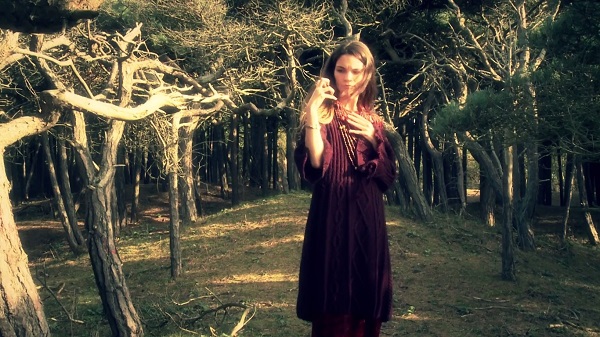
And because it’s presented as A Peoples Court it makes sense that the studio audiences in Glasgow and in Hong Kong can also see each other. So the whole conceit becomes quite believable. The entire production will also be livestreamed to an online audience. At the end, the audiences get to vote on whether Caliban is really a monster or whether he has been misunderstood.
Garry has a history of bringing visual art into theatre and making it part of the performance, especially with his company Fittings. For this production Kevin has created a range of visual artwork around the themes of home, belonging and otherness, which are used as part of the courtroom evidence and will hopefully become part of an exhibition that lives beyond the life of the show.
The character of Ariel, played by myself in Glasgow and by Joe Wong in Hong Kong presides over the court to judge what really happened when Miranda and Caliban met and Prospero didn’t approve. Paul Cunningham plays Prospero in Glasgow, whilst Jason Wong plays Caliban in Hong Kong. The premise is that Miranda has gone missing and because she’s not present we have to find out what’s happened. That’s the whole driving force behind the investigation.
The technology brings risk with it but also brings a lot of excitement. The performance will be in four different languages all at the same time: English, Cantonese, BSL and Chinese sign language. It’s quite a tall order, but why make it simple?


